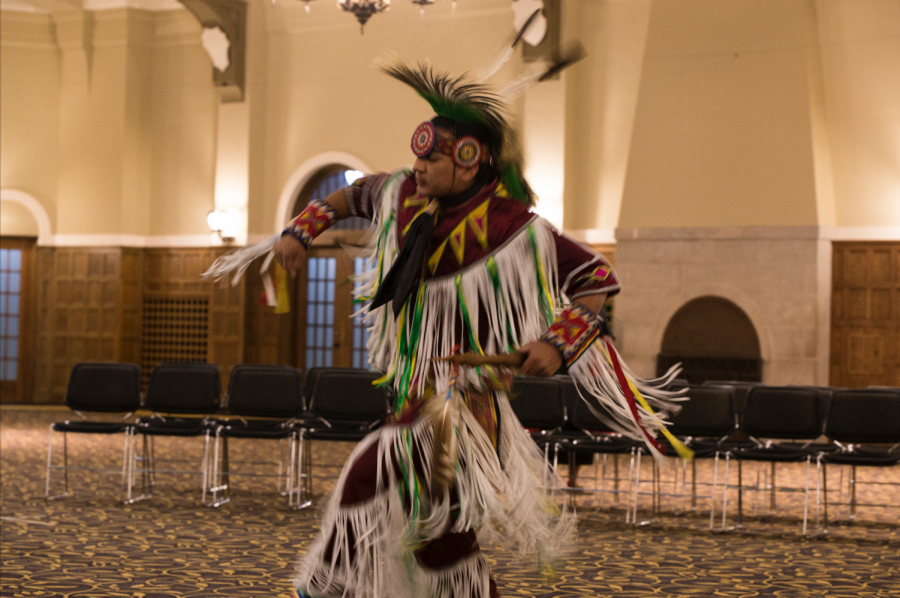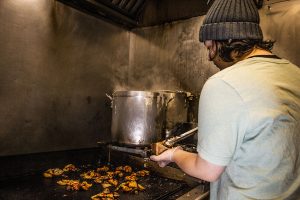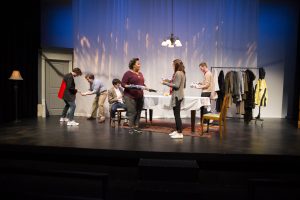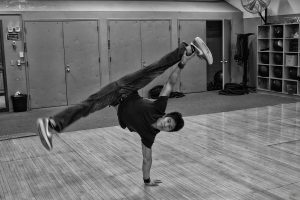A celebration of Native and self-defining culture
The Native American Student Association and the Latino Native Cultural Center hosted a night of dancing, music, and cultural celebration for Native American Heritage month.
A traditional Grass Dance during American Indian Dance Theater performance in the Main Ballroom of the IMU on Wednesday, Nov. 28. This event was hosted by the Native American Student Association.
November 29, 2018
Six-year-old Tess Lasley, a member of the Meskwaki Nation, dances with her mother in the center of the room. Spinning and twirling, knees bouncing high, straight-spined and elegant, they look nearly weightless as they dance together.
The dancers wear brightly colored ribbons, feathers, beads, and dance regalia. They hold out their arms, spreading the gold fabric draped over their shoulders, and spin as they perform the Native American Women’s Fancy Dance.
On the evening of Nov. 28 in the IMU Main Lounge, the University of Iowa Native American Student Association and Latino Native American Cultural Center hosted the American Indian Dance Theater, which featured the Morningstar Dance Troupe, as a part of Native American Heritage month.
“Every tribe has its own oral history, its own separate dances, its own explanation, and its own meaning,” said Tyler Lasley, also known as Mikona of the Meskwaki Nation. “The dances are handed down from each generation. I dance the Fancy Dance, which was handed down. My dad’s dad was a Fancy dancer, my dad was a Fancy dancer, now I am a Fancy dancer.”
Lasley sung and beat the deer-skin drum as his daughter and wife danced in the center of the room.
Throughout the event, other performers from the Morningstar Dance Troupe danced traditional Native American dances, such as the Grass Dance of the Northern Plains Tribes, that represents the symbolic flattening of grass before a Traditional Dance, the Crow Hop Dance that mimics a bird flitting on the ground, and the Men’s Traditional Dance that tells the story of a warrior’s hunting path.
The entire performance served to educate people about the diversity of Native American culture and to foster an understanding and respect in non-Native Americans toward the tradition of storytelling through dance. Through performances such as these, the Morningstar Dance Troupe breaks down long-standing stereotypes.
“We like to educate and show people who we are. Instead of non-natives saying, ‘these are Natives,’ we label ourselves,” Lasley said. “We’re Native, we’re proud, and we want to share it.”
For Lasley, Native American Heritage Month is about celebration and education.
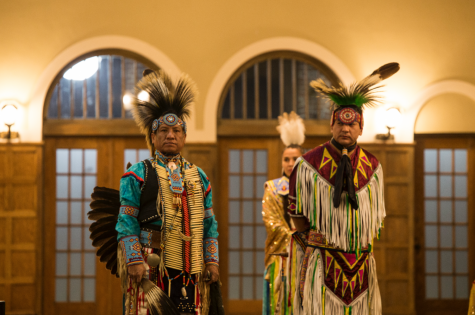
Two members of the Morningstar Dance Troupe during an American Indian Dance Theater performance in the Main Ballroom of the IMU on Wednesday, Nov. 28. This event was hosted by the Native American Student Association.
“[We are] sharing who we are and self-identifying — sharing that with people and understanding what people see,” he said. “We’re not the ‘Indian’ they’ve learned; it’s sad that the real history hasn’t been taught to schools. But that’s our job. To educate.”
Lasley also placed importance on how dance and song of any culture are means of expression, and Native American traditional dances are no different.
“When I sing, I’m giving a piece of myself to you, and sharing it, and hoping that you feel what I’m feeling,” he said. “When I’m singing, it’s not just banging a drum and yelling. When I sing, there is method, there is tempo.”
A large piece of the event was allowing individuals to define and describe their own culture.
“Yes, we want to share ourselves, [but we also want to] define ourselves,” he said. “We see how other people define us, in movies, in books, in textbooks. Non-Natives like to describe who we are. But we’re here to share ourselves, who we are. This is who we are, and we’re going to do that through song and dance.”
Adriana Peterson of the Navajo and Menominee Nations and president of the Native American Student Association, agrees.
“Showing respect for what we’re doing at this event breaks stereotype ideals that audience members may have of Native People and helps them learn another perspective on Native identities and cultural traditions learned through family history,” she said.
As a member of Iowa’s Native American Student Association, Peterson helped host the Morningstar Dance Troupe. She spoke of the Native American Student Association fondly, describing it as “an educational, social, and cultural group that promotes Native American rights, cultures, traditions, and identities to the Native and non-Native communities at the UI and surrounding Iowa City areas.”
“For me it’s more of a family — you get a tight, close-knit group of people,” she said. “Every Thursday night, you know you have a place to go. Every week, you find solace from the predominantly white institution.”



